|
|
|
|
From the Dean
|
 |
| |
Wednesday, December 18, 2013
When he lectured words fell out like fruit each shapely syllable locked into the next, his lips stitched with certainty and even the roots of his tiny beard were crisped with context. What we heard we respected, but the hole in his sock made us love him.
Carol Shields, “Professor”.
In this in augural issue, I thought I would begin by offering some reflection on my long career in the academy, beginning with my time as an undergraduate, followed by some lessons I have learned from antiquity. I hope this begins a dialogue on the importance of liberal education in the Academy.
The Professors
My professor of Roman History was a small man; he sat to lecture, always reading from his notes (I am sure they were yellow), not that he needed to read his notes. He was a brilliant scholar. But there was nothing animated in his delivery. Come to think about, there was really no delivery at all. He was soft spoken; one had to strain to hear him, and after every second sentence, he would pause to clear his throat. Occasionally he might try a joke, but the effort fell flat and rarely, if ever, raised a laugh. But the content of his lectures was stimulating. After all, Roman Republican History had enough intrigue and violence for everyone to appreciate.
By contrast, my Greek History Professor was enthusiastic and gregarious. There was a zest for life that came across in his lectures, which seems appropriate since the Greeks had an enthusiasm for life, which the Romans, in my mind, never quite shared; they always struck me as a much too serious bunch for my liking, and this perhaps explains why I became a Hellenist. My professor also taught me Greek; we read Thucydides and Aristophanes. I remember one year, I can’t recall whether it was our course on Thucydides or on Aristophanes, but after our final exam, he promptly took our papers to his office, which was down the hall from the senior undergraduate study room, to mark. A few moments later, I could hear roars of laughter coming from his office. My heart raced. I had mistranslated the text, I thought.
But this same professor was always generous with me; after we completed our Thucydides in the fall, he was scheduled for a winter sabbatical. I wanted to complete book one, as we had not finished it in class. As an eager undergraduate, not realizing that sabbaticals were sacred times, when faculty tried to escape their students, I persuaded him to meet with us once a week to finish the text.
So every Tuesday evening, a fellow student and I would go off to his house and read Thucydides. This gesture endeared him to me. Over the years we kept in contact. Occasionally I would get an email from him. In his final years he was wheelchair ridden, but still active mentally. The last time I heard from him, he was translating his way through Pausanias, no small feat. He has since passed on, but my memory of him is not forgotten.
In my final year as an undergraduate, one of my professors invited me to join a seminar on Catullus, which I had not signed up for. I already had a full course load. I foolishly agreed, not realizing I was stepping into a trap. She was wicked but in a good way. I was the only male in the class. I recall being assigned Catullus 13, where the poet promises to Fabullus, love’s very essence or something even sweeter and more delicious than love, the perfume which Venus and Cupid had given to his mistress—once Fabullus had a sniff of its fragrance, he would pray to the gods to become all nose. In preparation for my presentation, I also recall being assigned an article in which a professor from the University of Hawaii (the location sticks in my mind) argues that Venus’s unguent was, in fact, Lesbia’s vaginal secretions. I had to present this and Catullus 13 to my professor
and classmates, all women, me, a young man of twenty, from a deeply religious background. Needless to say I was shattered but in a good way. I would not trade any of these moments, even the uncomfortable ones. They are what made me love the Academy, a place where eccentrics can thrive and make a difference in the lives of young people.
Sophistic Education
The point of my last anecdote is that liberal education, when done well, has a way of discombobulating the soul, stripping us bare and exposing us (to continue the metaphor from Catullus) by challenging our way of viewing the world. In this regard, I turn for inspiration to Ancient Athens, whose democracy for all its inherent inequalities and flaws, valued open debate and dialogue, which I think are essential features of any liberal society and, in particular, the Academy. Into this democratic milieu of Ancient Athens came our first real professors, the sophists, who taught on a wide range of subjects from natural philosophy and mathematics to language and rhetoric, what today would make up a liberal education at a university.
I hold up the sophists as a model, much to the displeasure of some my colleagues, who tend to privilege Plato over other thinkers of his day, because the sophists embody for me what the Academy should be about. One underlying principle behind the teaching of the sophists was that excellence could be taught and one could self-improve through education. What intrigues me most, though, about the sophists is how subversive they were perceived to be (and Socrates was no exception and was viewed as a sophist by his fellow Athenians): they challenged traditional beliefs, accepted notions of right and wrong, and pushed the boundaries of man’s view of the natural world and the universe.
Their teaching aggravated to no end the elite of their day and excited the imagination of the young. Should we not do the same? What was considered morally wrong in Greece might not, however, be considered so among the Barbarians; in fact, morality is often a matter of custom and not indelible nature. They challenged and undermined accepted notions of the “Other”. A sophist, like Protagoras, who believed that his teaching had practical application (and I would argue that a liberal education in fact does), taught that there were at least two sides to every argument.
The value in this kind of education is that it allows one to come to understand and appreciate more fully the position of the other side and to me that can only be a good thing. What relevance my remarks have on what we do in the Academy today, I will leave for you to debate. But I would suggest two questions to start the discussion. First, I think that there is increasingly a risk that what we do, particularly in the Humanities but to an increasing degree in the pure Sciences, is deemed irrelevant and unimportant. In the current climate under which governments and the public are demanding that universities offer a more meaningful education (by which they mean preparation for jobs), how do we define what is meaningful and not have that meaning defined for us? Secondly, how as academics do we interface with the current generation of students, the millennium generation, who are digital
natives and citizens of a network culture, to use Taylor’s term (Crisis on Campus: A Bold Plan for Reforming our Colleges and Universities), where information moves freely in various forms across decentralized networks on the web, and as it circulates is broken down, reassembled, modified, added to and layered? How do we approach this culture in a way that reaffirms our relevancy and currency as academics and institutions of higher learning? Perhaps this is more of a philosophical question that speaks to core of what we value, but it is a question worth asking. Is what we do relevant and why?
And here I return to the sophists. As educators, who challenged their students to think critically about received traditions, who encouraged them to deconstruct and reassemble myths, which were themselves permeable and subject to change and manipulation, the sophists were responding to a new, exciting culture in Ancient Athens, a democratic culture that assumed that there were many points of view, a multiplicity of perspectives which should be expressed and heard. In this regard I think Plato got it right when he accused the sophists of being products of their own time. But their education had currency, and without the sophists, there would have been no Socrates, who knew how to ask probing questions that had never been asked before, which is the first step toward critical thinking.
Craig Cooper
Dean, Arts and Science
Go To Top
|
|
|
New Faculty
The Faculty of Arts & Science continues to grow and as such we are delighted to introduce our new faculty members:
-
Helen Connolly, Academic Writing | Academic Assistant, Instructor
-
Rebekah Eckert, Academic Writing | Academic Assistant, Instructor
-
Randall Barley, Biological Sciences | Academic Assistant, Instructor
-
Greg Pyle, Biological Sciences | Associate Professor & CAIP Chair
-
Tracey Roemmele, Chemistry & Biochemistry | Assistant Professor
-
Laura Chasmer, Geography | Assistant Professor
-
Chris Hopkinson, Geography | Associate Professor & CAIP Chair
-
Ravinder Virk, Geography | Academic Assistant, Instructor
-
Kristine Alexander, History | Assistant Professor & CRC Tier II
-
Marie-France Haudecoeur, Modern Languages | Visiting French Language Assistant
-
Majid Heidari Mohajerani, Neuroscience | Assistant Professor & CAIP Chair
-
Locke Spencer, Physics & Astronomy | Assistant Professor & CRC Tier II
-
Stephanie Hancock, Psychology | Academic Assistant, Instructor
-
Trina Filan, Women & Gender Studies | Assistant Professor
Within this issue we would like to highlight our newest Chairs by introducing you to Greg Pyle, Chris Hopkinson, Kristine Alexander, Majid Heidari Mohajerani & Locke Spencer.
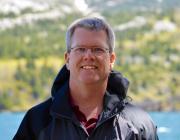 Greg Pyle joined the Department of Biological Sciences as an Associate Professor and CAIP Chair in Aquatic Health
on Jan. 1, 2013. Prior to taking up a CAIP Chair position, Pyle was a Canada Research Chair in Environmental Biotechnology and Ecotoxicology at Lakehead University in Thunder Bay Ontario (2008-2012). Before that, Pyle was with the Department of Biology at Nipissing University (2001-2008) where he served as Chair of Biology from 2005 to 2008. Greg Pyle joined the Department of Biological Sciences as an Associate Professor and CAIP Chair in Aquatic Health
on Jan. 1, 2013. Prior to taking up a CAIP Chair position, Pyle was a Canada Research Chair in Environmental Biotechnology and Ecotoxicology at Lakehead University in Thunder Bay Ontario (2008-2012). Before that, Pyle was with the Department of Biology at Nipissing University (2001-2008) where he served as Chair of Biology from 2005 to 2008.
Pyle has published extensively on metal effects on fish and aquatic invertebrates and is currently co-editing a book on the biology of yellow perch. He has given over 100 presentations at conferences around the world on topics related to environmental contamination. He has served as a regular peer reviewer for several journals, including Aquatic Toxicology, Environmental Science and Technology, and Environmental Toxicology and Chemistry. He served on the NSERC Strategic Panel for Healthy Environments and Ecosystems as a regular member (2009-2010) and as Chair (2011). Learn more about Greg.
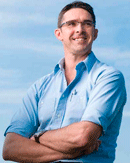 Chris Hopkinson
is the Campus Alberta Innovates Program (CAIP) Research Chair in Terrestrial Ecosystems Remote Sensing. He was appointed to this position in 2013 after spending a year as a visiting environmental scientist with the Commonwealth Scientific and Industrial Research Organisation (CSIRO) in Canberra, Australia. Prior to this he led the airborne lidar research and outreach activities of the Canadian Consortium for Lidar Environmental Applications Research (C-CLEAR) while employed as a research scientist and lecturer at the Applied Geomatics Research Group in Nova Scotia. Find out more. Chris Hopkinson
is the Campus Alberta Innovates Program (CAIP) Research Chair in Terrestrial Ecosystems Remote Sensing. He was appointed to this position in 2013 after spending a year as a visiting environmental scientist with the Commonwealth Scientific and Industrial Research Organisation (CSIRO) in Canberra, Australia. Prior to this he led the airborne lidar research and outreach activities of the Canadian Consortium for Lidar Environmental Applications Research (C-CLEAR) while employed as a research scientist and lecturer at the Applied Geomatics Research Group in Nova Scotia. Find out more.
 Kristine Alexander is the Assistant Professor of History
& the newly announced Canada Research Chair (Tier 2) in Child and Youth Studies (I-CYS). Kristine Alexander’s research investigates how young people in the early to mid-twentieth century influenced and were affected by imperialism, colonialism, and war. She is currently working on two projects: a book about the imperial and international histories of the Girl Guide Movement, and a study of Canadian families, children and letter-writing during the First World War. Her recent and forthcoming publications include articles in Young People, Texts, Cultures
and The Journal of the History of Childhood and Youth, as well as chapters in the following books: Colonial Girlhood/Colonial Girls (Palgrave Macmillan, forthcoming), Within and Without the Nation: Canadian History as Transnational History (University of Toronto Press, forthcoming), A Sisterhood of Suffering and Service:Canadian and Newfoundland Girls and Women and the First World War (UBC Press, 2012), and Scouting Frontiers: Global Youth in the Scout Movement’s First Century (Cambridge Scholars Press, 2009). Kristine Alexander is the Assistant Professor of History
& the newly announced Canada Research Chair (Tier 2) in Child and Youth Studies (I-CYS). Kristine Alexander’s research investigates how young people in the early to mid-twentieth century influenced and were affected by imperialism, colonialism, and war. She is currently working on two projects: a book about the imperial and international histories of the Girl Guide Movement, and a study of Canadian families, children and letter-writing during the First World War. Her recent and forthcoming publications include articles in Young People, Texts, Cultures
and The Journal of the History of Childhood and Youth, as well as chapters in the following books: Colonial Girlhood/Colonial Girls (Palgrave Macmillan, forthcoming), Within and Without the Nation: Canadian History as Transnational History (University of Toronto Press, forthcoming), A Sisterhood of Suffering and Service:Canadian and Newfoundland Girls and Women and the First World War (UBC Press, 2012), and Scouting Frontiers: Global Youth in the Scout Movement’s First Century (Cambridge Scholars Press, 2009).
 This past August 2013, Majid Mohajerani joined the Department of Neuroscience as an Assistant Professor and CAIP Research Chair in Brain Health and Dementia. This past August 2013, Majid Mohajerani joined the Department of Neuroscience as an Assistant Professor and CAIP Research Chair in Brain Health and Dementia.
Majid's lab employs in vivo optical methods such as two-photon microscopy and voltage sensitive dye imaging, to study neural activity on the subcellular, cellular, and circuit level in real-time. His research focuses on the physiological and computational basis of sensory perception and associative learning at the level of individual neurons and their synaptic interactions within complex neural circuits. Learn more about Majid.
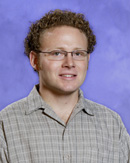 The University of Lethbridge's first graduate in the Earth, Space and Physical Science PhD program has come back to the U of L through the Canada Research Chairs program. The University of Lethbridge's first graduate in the Earth, Space and Physical Science PhD program has come back to the U of L through the Canada Research Chairs program.
Locke Spencer joins the Department of Physics & Astronomy as a Tier II Canada Research Chair in Experimental Astrophysics. The focus of Spencer's research program will include the development of instrumentation unique within Canada, as well as the creation of new observation and data processing techniques that will be used for future large-scale international projects.
Spencer's studies will advance the understanding of the evolution of the Universe through next-generation far-infrared space-based astrophysical instrumentation and will position Canada as a significant contributor to international research projects. Learn more about Locke.
Go To Top
|
|
|
Research in the News
|
 |
| |
October 28, 2013 | Kovalchuk wins ASTech Award for agricultural contributions
The biological sciences researcher is currently working with a Canadian biotech company that plans to develop a market for the high thebaine poppy industry in Canada
October 22, 2013 | Biological Information Processing program puts research in the hands of students
BIP provides undergraduate, graduate students and post-doctoral fellows with hands-on experience that is easily translatable to industry
October 22, 2013 | Oral History Project brings the past to life
The story-gathering initiative is aimed at helping people to enhance their understanding of artist Nicholas de Grandmaison and his unique connections to First Nations communities
October 17, 2013 | U of L maintains top-three Research Infosource ranking
Alberta universities see dramatic drops in provincial research funding, leading to lower rankings across the board
October 9, 2013 | Morgentaler earns SSHRC grant to study life of Rosenfarb
Morgentaler is looking to bring a greater awareness of the world-renowned Yiddish author, poet and Holocaust survivor to English-speaking audiences
October 9, 2013 | Belanger exploring the role of traditional city planning
Using a SSHRC Insight Grant, he will examine how city planning can be improved to help strengthen bonds between Aboriginal and non-Aboriginal residents
October 8, 2013 | Insight Grant funding illustrates breadth of University's humanities research
Five U of L researchers have received Social Sciences and Humanities Research Council (SSHRC) Insight or Insight Development Grant funding with a total value of nearly $675,000
October 8, 2013 | Malacrida examining disability, sexuality and parenting in Alberta
While eugenics is no longer acceptable, informal practices that limit disabled people’s access to sexuality, reproduction and family life persist
October 8, 2013 | Grant allows Harding opportunity to study Buddhism in Canada
With an estimated population of more than 365,000 and a strong presence in southern Alberta, Canadian Buddhists have more than a century of religious practice to their credit
October 3, 2013 | Water researchers to collaborate with Fulbright Canada Visiting Research Chair
Fulbright Canada Visiting Research Chair Bryan Brooks to work on projects of common importance to communities on both sides of the Canada-US border
September 27, 2013 | Wieden named Alberta Innovates-Technology Futures Bioengineering Chair
The $2-million investment, over five years, further enables Dr. HJ Wieden’s research team to pursue the advancement of biomolecular engineering and synthetic biology
September 19, 2013 | Functional Flows
Dr. Stewart Rood and a team of researchers engage in a critical study investigating Alberta's water supply
|
|
|
Spotlight on Conference & Events
|
 |
|
Keynote Speakers:
-
Tom Steitz, Yale University, USA
-
Joan Steitz, Yale University, USA
Invited Speaker:
-
Nahum Sonenberg, McGill University, Canada
-
Brenda Bass, University of Utah, USA
-
François Bachand, Université de Sherbrooke, Quebec, Canada
-
Bonnie Schmidt, Let’s Talk Science, Canada
 In 2014, the RiboWest Conference will take place for the 10th time, and we would like to invite you to this special event! The UofL and ARRTI
are proud to host the event and welcome all to campus. To celebrate the 10th anniversary, there will be more fascinating speakers than before and some special events such as a trip to the Rocky Mountains. The RiboWest Conference is an annual meeting of RNA researchers from western Canada and beyond. In particular, we welcome whole research groups to attend as we offer several opportunities for young researchers in a very friendly setting. This meeting is an excellent opportunity for networking, establishing new collaborations and having fun in sharing our enthusiasm for RNA. The first RiboWest Conference has been organized in 2005 by Stephen Rader at the University of Northern British Columbia in Prince George, BC. Since 2008, this annual Conference alternates between Prince George and Lethbridge. In 2014, the RiboWest Conference will take place for the 10th time, and we would like to invite you to this special event! The UofL and ARRTI
are proud to host the event and welcome all to campus. To celebrate the 10th anniversary, there will be more fascinating speakers than before and some special events such as a trip to the Rocky Mountains. The RiboWest Conference is an annual meeting of RNA researchers from western Canada and beyond. In particular, we welcome whole research groups to attend as we offer several opportunities for young researchers in a very friendly setting. This meeting is an excellent opportunity for networking, establishing new collaborations and having fun in sharing our enthusiasm for RNA. The first RiboWest Conference has been organized in 2005 by Stephen Rader at the University of Northern British Columbia in Prince George, BC. Since 2008, this annual Conference alternates between Prince George and Lethbridge.
Organizers:
 
Contact:
ribowest@uleth.ca
Go To Top
|
|
|
Students | What are They Up To?
November 12, 2013 | Breanne Kamenz MSc (Chem) 2013
Occupational Hygiene Technologist in the Environmental Health and Safety Office at the University of Manitoba (started Nov. 12/13
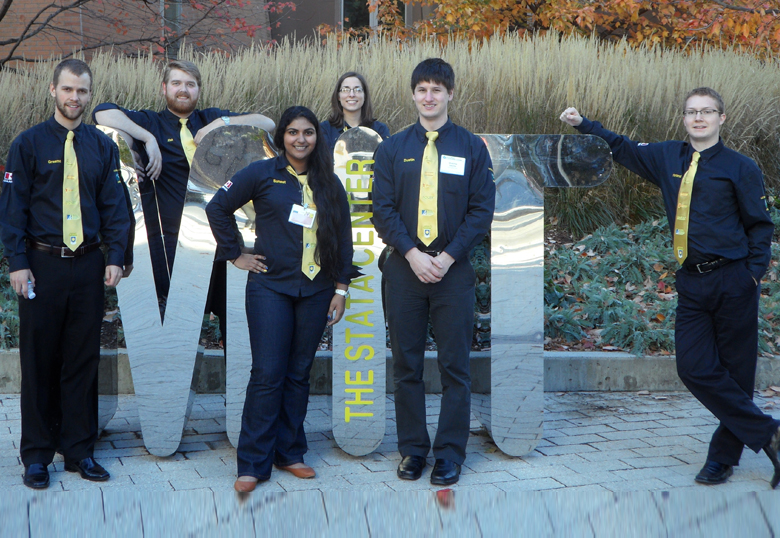 November 8, 2013 | U of L's iGEM Team claims two awards at World Jamboree November 8, 2013 | U of L's iGEM Team claims two awards at World Jamboree
Competing at the iGEM 2013 World Championship Jamboree, the U of L team won Best Poster in the Overgrad class and also collected the Security Commendation
October 28, 2013 | Programming team wins regional, again qualifies for world finals
For the second successive year, the U of L will send a team of programmers to the International Collegiate Programming Contest World Finals in Russia
October 2, 2013 | Master's candidate Pryor looking at the bigger picture
Studying imaging science, Logan Pryor recently spent time in Italy working at the European Space Agency lab
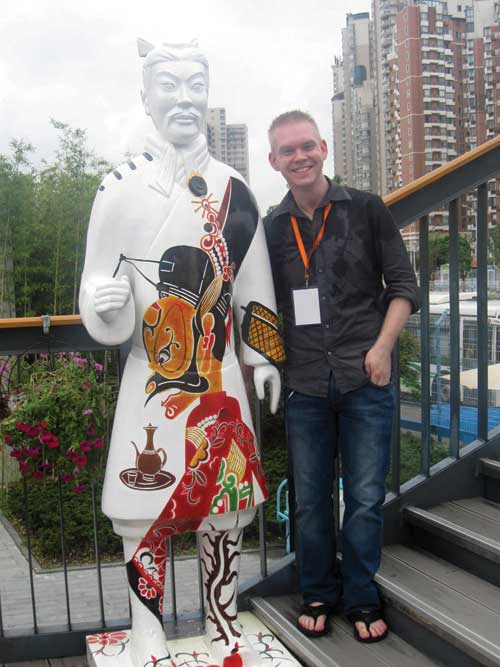 December 21, 2010 | Flohr uses U of L foundation as a springboard December 21, 2010 | Flohr uses U of L foundation as a springboard
University of Lethbridge alumnus Lee Flohr (BSc '07) took what he called the trip of a lifetime recently to Shanghai, China, rubbing elbows with world-class science journalists and high-profile, Nobel prize winning scientists from Britain and China.
UPDATE: After receiving a degree in biochemistry from the University of Lethbridge, Lee moved to the media capital of Canada, Toronto, to study online and broadcast journalism at one Canada's leading journalism institutions, Humber Institute of Technology and Advanced Learning. As an emerging science journalist, Lee Flohr as launched Science Fare Media
web page, the world’s newest – and Canada’s first – online and interactive Sci-Tech and Health News Organization! The flagship component of Science Fare Media, Science-Fare.com will provide you with the latest journal discoveries and the science behind the headlines in a way that’s interesting and engaging, while being conversational and fun, reaching out to both scientists and science enthusiasts, alike.
|
|
|
Announcements
Institute for Child & Youth Studies (I-CYS) CRC Announcement
Kristine Alexander | Friday, November 22nd, 2013 at 11am | Markin Hall
Centre for Oral History & Tradition (COHT) Launch
Led by Heidi MacDonald, Tuesday, November 26th, 2013 at 11am | Galt Museum
Apply for the Teaching Development Fund (TDF) | Teaching Centre
The Teaching Centre invites all faculty members to apply for financial support of up to $5000 for projects to enhance teaching effectiveness. Projects can be on any aspect of teaching, learning, and evaluation. Apply today. Deadline: January 17, 2014
Distinguished Teaching Award
The Distinguished Teaching Award was established in 1987 at the University of Lethbridge under the auspices of the President. The award is in recognition of the central importance of teaching to the philosophy and goals of the University of Lethbridge and to provide recognition to those members of the academic staff who excel in teaching.
The award is open to all full and part‐time members of the academic staff currently employed at the University of Lethbridge (i.e. who have taught for the University since July 1, 2012 or, in the case of retired academic staff members, who have an agreement with the University to perform teaching duties in the near future). Each year the Selection Committee for Distinguished Teaching Award selects, from among nominees provided by members of the university community, usually one member of the academic staff for an award. The award consists of a medal and a certificate presented to the recipient at Convocation, and the inclusion of the recipient's name on a list of Distinguished Teaching Awards published annually in the University Calendar.
The deadline for receipt of nominations is 4:00 P.M., FEBRUARY 1, 2014. Nominations which are incomplete as of this deadline will be returned to the nominator. Additional information, guidelines and forms are available here.
Corporate Cell Phone/Smart Phone Plan Change
Changes to the University's plan will be taking effect November 22. See the details here.
Facilities Leadership Change
Please see the announcement from Vice-President Nancy Walker regarding the recent change in leadership in the Facilities Department.
University seeks input on Destination Project
The University is seeking input on the Destination Project - site selection for the facility is underway and community input is needed for the project. View the site selection presentation and leave your comments on the web site.
DELF testing available
Registrations for DELF-DALF tests are taking place right now. Learn more here.
Food for Thought program accepting applications
With generous support from Dr. Jennifer Mather, a fund has been created with the underlying philosophy that no one in the campus community should go hungry. The Department of Human Resources welcomes applications put forward by members of the University of Lethbridge community, whether individuals and/or groups, for projects which support initiatives related to accessibility of food for students. Click here for more information.
FNMI protocol handbook created
The University of Lethbridge General Faculties Council has approved a unique protocol handbook that will serve as a guideline for University of Lethbridge faculty, staff, students and board and senate members when incorporating Blackfoot and other First Nations, Métis and Inuit (FNMI) cultural elements into activities or ceremonies on campus.
Associate Vice-president, Students, Dr. Judith Lapadat says the information in the FNMI Handbook was extensively reviewed, and will be made widely available.
The protocol guide explains the significance of FNMI traditional activities at events such as convocation, the significance of an eagle feather gift (pictured above) and also how to properly pronounce a greeting in Blackfoot, among other topics. Learn more here.
Cloud computing offered at no cost to Alberta startups and researchers
Up to one year of free access to cloud computing is now available to Alberta researchers and entrepreneurs through a pilot program designed to advance the use of technology in the province.
Research and education organizations, and entrepreneurs, are the target users of the cloud services being offered by Alberta’s not-for-profit advanced technology agency, Cybera. The service, called the Rapid Access Cloud, is available for prototyping and research. Get the details here.
Go To Top
|
|
|
Calendar
Upcoming Events
ACM ROCKY MOUNTAIN REGIONAL PROGRAMMING CONTEST EXPERIENCE
Friday, November 22, 2013 - 12:00pm - 12:50pm
Location: D632
November 25 -- SACPA On Campus Session - No science, No evidence, No truth, No democracy (Dr. Katie Gibbs)
November 27 -- Modern Languages: "Friends and Family" Film Series -- Under the Same Moon (Spanish)
Guest Speaker - Dr. Gregory Welch
Wednesday, November 27, 2013 - 12:00pm
Location: C610
November 29 -- Prentice Institute: Earning Differentials of Males and Females in Same-sex and Different-sex Couples in Canada, 2006 - 2010 (Dr. Rick Mueller)
Deadliines to Note
ARTS & SCIENCE WAIT-LIST FOR Spring 2014
Wednesday, November 27, 2013 - 9:30am - Monday, December 2, 2013 - 3:30pm
Go To Top
|
|
|
|
|
|



 Greg Pyle joined the Department of
Greg Pyle joined the Department of  Chris Hopkinson
is the Campus Alberta Innovates Program (CAIP) Research Chair in Terrestrial Ecosystems Remote Sensing. He was appointed to this position in 2013 after spending a year as a visiting environmental scientist with the Commonwealth Scientific and Industrial Research Organisation (CSIRO) in Canberra, Australia. Prior to this he led the airborne lidar research and outreach activities of the Canadian Consortium for Lidar Environmental Applications Research (C-CLEAR) while employed as a research scientist and lecturer at the Applied Geomatics Research Group in Nova Scotia.
Chris Hopkinson
is the Campus Alberta Innovates Program (CAIP) Research Chair in Terrestrial Ecosystems Remote Sensing. He was appointed to this position in 2013 after spending a year as a visiting environmental scientist with the Commonwealth Scientific and Industrial Research Organisation (CSIRO) in Canberra, Australia. Prior to this he led the airborne lidar research and outreach activities of the Canadian Consortium for Lidar Environmental Applications Research (C-CLEAR) while employed as a research scientist and lecturer at the Applied Geomatics Research Group in Nova Scotia.  Kristine Alexander is the Assistant Professor of
Kristine Alexander is the Assistant Professor of  This past August 2013, Majid Mohajerani joined the Department of
This past August 2013, Majid Mohajerani joined the Department of  The University of Lethbridge's first graduate in the Earth, Space and Physical Science PhD program has come back to the U of L through the Canada Research Chairs program.
The University of Lethbridge's first graduate in the Earth, Space and Physical Science PhD program has come back to the U of L through the Canada Research Chairs program.

 In 2014, the
In 2014, the 

 November 8, 2013 |
November 8, 2013 |  December 21, 2010 |
December 21, 2010 |